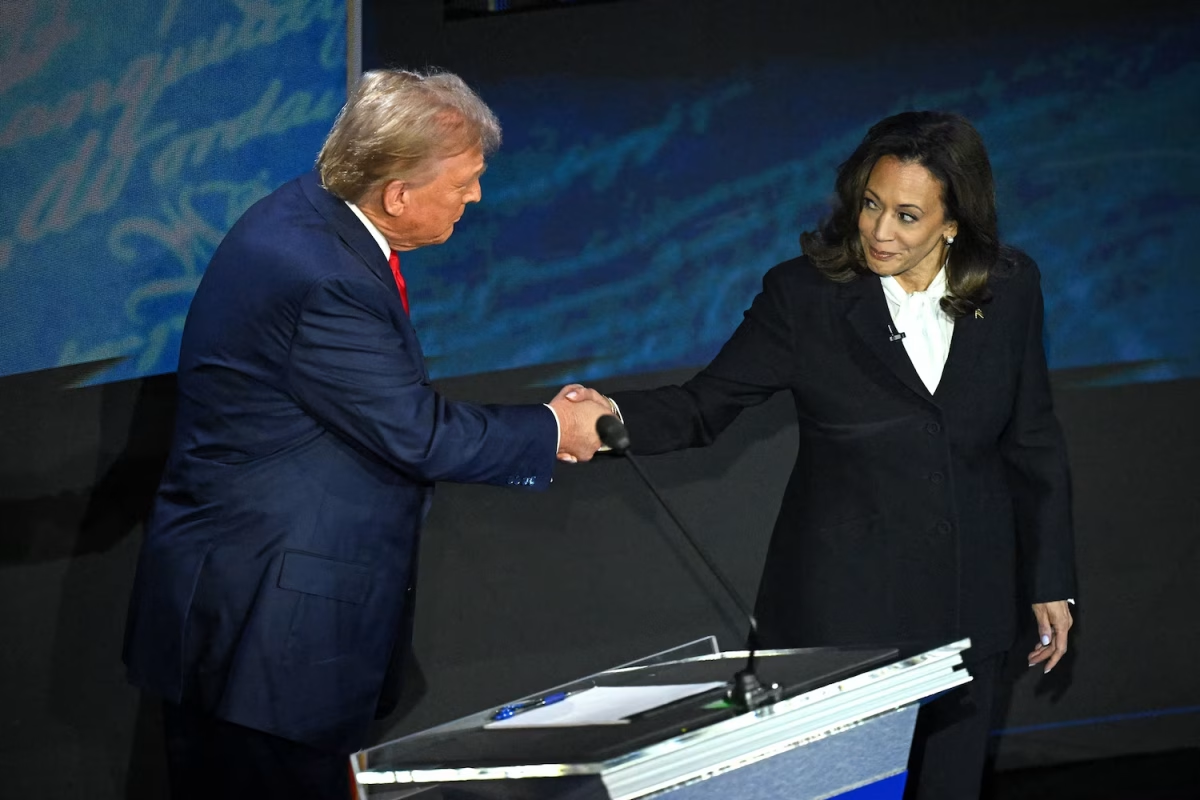
Saul Loeb/AFP-Getty Images
Vice President Harris and Former President Trump Shake hands at Presidential Debate. From ABC News.
If any Americans did not make themselves aware of the 2024 presidential election results on the morning of November 5, they had only to open social media to find themselves immediately better informed. This past Tuesday, my Instagram was flooded by a barrage of election commentary nearly outnumbering the considerable output of Halloween-themed posts days before. Classmates and mutuals were reposting press coverage of Trump’s victory on their stories–coverage ranging from the RNC’s image of a smiling, benevolent president-elect to Vanity Fair’s close-up of a red-eyed, belligerent Trump frowning at the viewer behind a list of his recent crimes (including, but not limited to, thirty-four felony counts, two impeachments, and one conviction).
I credit Instagram for keeping me informed not only on current events but on the political opinions of my peers. Truth be told, I was surprised to see so many teenagers broadcasting their beliefs–some acquaintances further subverted my expectations by reposting from accounts that were more conservative or liberal than I would expect. It was always my feeling that most teenagers spend very little time thinking about politics–that what beliefs we have are primarily an amalgamation of our parents’ views, the opinions most commonly accepted where we grew up, and the endorsements of our favorite cultural icons (take Taylor Swift’s support of Kamala Harris or UFC’s Dana White endorsing Trump). The passion and fervor I was met with on November 5th seemed completely unprecedented.
This is not to say that I doubt the teenage capacity for independence of thought. In the weeks following the election, when I spent more time talking politics than I have during the rest of 2024 combined, I’ve listened to many of my friends discuss their beliefs on the issues that matter to them, from the environment to immigration to women’s rights. But beyond the specific issues I know my peers care about, it’s been my assumption that many people my age–myself included–simply lack the experience required to develop deeply held political opinions. If that informal evaluation is correct, the high number of teenagers posting politics contradicts the relatively low number of teenagers with strong political convictions, suggesting that some people who post politics don’t necessarily uphold these beliefs in real life. You don’t have to be an expert on a subject to have an opinion, but it seems prudent to do your research before sharing that opinion on social media.
Most Instagram users my age have upwards of five hundred followers–in some cases, upwards of one thousand. When you post politics, you broadcast your beliefs–well-developed or not, backed by research or not–to each and every person in this considerable assembly. Talking from behind a screen might seem harmless, but think about how we deal with politics in real life: most of us avoid discussing controversial issues with friends or at Thanksgiving because of how easily such discourse devolves into argumentation. Considering how difficult it is to tactfully discuss politics in person, should we really be expressing partisan sentiments through social media? People who choose to post politics should be aware that they’re broadcasting opinions that are best shared face-to-face, where there’s room for nuance and thoughtfulness–things that social media, without fail, kills.